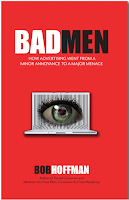“You’re seeing the end of the era of mass marketing." Jim Nail, Principle Analyst for Forrester Research, The New York Times, 2004.
A few weeks ago, in a post entitled "
Does Targeting Work?" we explored the popular idea that "the era of mass marketing" has ended as a result of our new found ability to target individual consumers. We concluded that not only has our ability to target individuals not lead to better results, it has actually lead to substantially worse results.
"As we have developed the ability to target people more and more precisely on the web, click-through rates of these hyper-targeted ads have dropped dramatically."
Facts, however, never seem to bother ideologues. They just re-arrange their justifications.
A second part of the theory of the death of mass marketing is that consumers are no longer susceptible to mass-delivered marketing messages (code for ads) and what they are really finding compelling is "content" -- whatever the hell that means -- that lives on the web. Once again, this belief is more a product of ideology than facts.
In fact, mass marketing, as enabled by mass media, is becoming frighteningly ubiquitous.
The world's most successful brands have learned to use mass media to achieve share-of-mind ascendancy and make it immensely difficult for new entries into a vast swath of consumer goods and service categories. You want to introduce a new brand of toothpaste or peanut butter? Good luck.
The ability to utilize and influence mass media has become as important as manufacturing and customer service in creating successful marketing enterprises.
You don't have to dig very deep to find examples of awful companies (think banks, telecom, airlines, food) whose reputations among consumers are abysmal, but whose size has allowed them to dominate media and consequently dominate marketing in their categories.
The people who keep insisting that mass media and mass marketing are dead are brilliant at seeing all the trees, but are blind to the forest. They know about every app, widget, and website, but they can't see that it's all melding with TV, print, and radio to create an even more pervasive mega-media that is infecting and affecting everything we say and do.
To emphasize my point, here is a list. Can you tell what it's a list of?
The iPhone
Casey Anthony
Kim Kardashian
Katy Perry
Jennifer Lopez
Lindsay Lohan
American Idol
Jennifer Aniston
The earthquake in Japan
Osama bin Laden
The answer is, it is a list of the top ten Yahoo searches in 2011. But it might as well be any other list of what fascinated pop media in 2011. The idea that the web is different in kind or superior in some way to the rest of the mediaplex is absurd. It's just another delivery system for the same crap.
The fact that the web has become so big so fast was supposed to mean TV would shrivel and eventually die. In fact, TV viewing is at its highest point ever. The web has just
added to -- not replaced -- the amount of media we are gorging on. And that amount is alarming.
If you believe that mass marketing is going to disappear, then you must also believe that by some miracle mass media will defy every precedent in history and become
more pervasive but
less influential.
There will be emails arriving later today explaining to me how I just don't get it. How people no longer trust advertising and are relying on peer-to-peer recommendations to make buying decisions.
Before you write that email, let me reply: No,
you don't get it. Sure people use the web in a social way to find stuff and get information. But the peer-to-peer stuff is the tip of the web iceberg. It is dwarfed by the way the web has become just another engine for spreading the media gospel of what we are supposed to believe and how we are supposed to behave. Once again, we are seeing a tree and missing a forest.
Right now,
YouTube is producing a slew of new "channels." They have a decidedly familiar ring to them: sitcoms, sports, scripted series, celebrity showcases. Although the long-promised convergence of the web and TV has not yet arrived there is one thing we can deduce from
YouTube's effort -- no one wants TV to be more like the web. They want the web to be more like TV.
In fact, if there is one thing that last Sunday's Super Bowl orgy should have taught us it is that TV is driving web usage and the web is driving TV usage. They are joined at the hip. Defining one as a mass medium and the other as a peer-to-peer social medium or a marketer-to-consumer personal medium is a game for fools.
It is never wise to draw straight lines between the present and the future. History and culture don't move in straight lines. (This is why the predictions of experts are so often laughable from a distance.) Nonetheless, if the trends that exist today continue on their current trajectories, mass media -- including the web -- will dominate marketing as never before. They may ultimately result in "the end of the era of mass marketing." And usher in a new era of
hyper-mass marketing.




